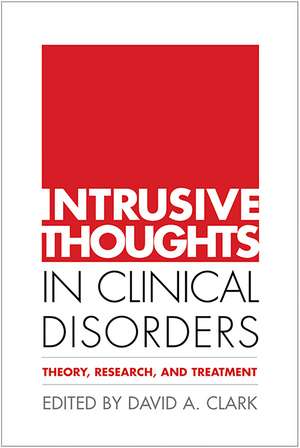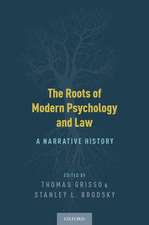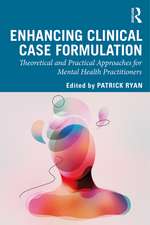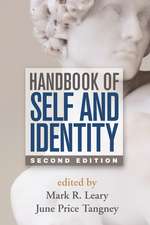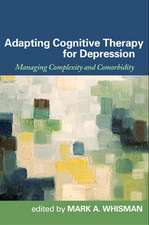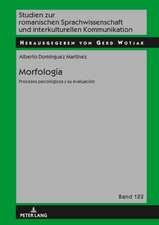Intrusive Thoughts in Clinical Disorders: Theory, Research, and Treatment
Editat de David A. Clarken Limba Engleză Hardback – 9 dec 2004
Advancing our understanding of the cognitive underpinnings of psychopathology, this is the first volume to focus on the role of unwanted intrusive thoughts, images, and impulses in a variety of psychological disorders. Leading experts explore the nature and causes of cognitive intrusions, examining how they become so persistent--and distressing--for certain individuals. Compelling findings are presented on the contribution of these phenomena to the etiology and maintenance of such diverse problems as obsessive-compulsive disorder, posttraumatic stress disorder, depression, generalized anxiety disorder, insomnia, and sexual offending. Highlighting important questions for future research, each chapter also discusses practical implications for assessment and treatment. Clearly organized and tightly edited, this book will inform the work of researchers, students, and clinicians alike.
Preț: 321.26 lei
Preț vechi: 338.16 lei
-5% Nou
Puncte Express: 482
Preț estimativ în valută:
61.47€ • 63.42$ • 51.30£
61.47€ • 63.42$ • 51.30£
Carte disponibilă
Livrare economică 05-19 martie
Preluare comenzi: 021 569.72.76
Specificații
ISBN-13: 9781593850838
ISBN-10: 1593850832
Pagini: 255
Dimensiuni: 152 x 229 x 21 mm
Greutate: 0.49 kg
Ediția:New.
Editura: Guilford Publications
Colecția Guilford Press
ISBN-10: 1593850832
Pagini: 255
Dimensiuni: 152 x 229 x 21 mm
Greutate: 0.49 kg
Ediția:New.
Editura: Guilford Publications
Colecția Guilford Press
Public țintă
Postgraduate and Professional Practice & DevelopmentCuprins
1. Unwanted Intrusive Thoughts in Nonclinical Individuals: Implications for Clinical Disorders, David A. Clark and Shelley Rhyno
2. Intrusive Thoughts in Posttraumatic Stress Disorder, Sherry A. Falsetti, Jeannine Monnier,
and Heidi S. Resnick
3. Seeking Solace but Finding Despair: The Persistence of Intrusive Thoughts in Depression, Richard M. Wenzlaff
4. Unwanted Intrusive Thoughts in Insomnia, Allison G. Harvey
5. Worry, Intrusive Thoughts, and Generalized Anxiety Disorder: The Metacognitive Theory and Treatment, Adrian Wells
6. Thinking Is Believing: Ego-Dystonic Intrusive Thoughts in Obsessive-Compulsive Disorder,
David A. Clark and Kieron O'Connor
7. Psychosis and the Phenomenon of Unwanted Intrusive Thoughts, Anthony P. Morrison
8. Unwanted Thoughts and Fantasies Experienced by Sexual Offenders: Their Nature, Persistence, and Treatment, W. L. Marshall and Calvin Langton
9. Unwanted Intrusive Thoughts: Present Status and Future Directions, Christine Purdon
2. Intrusive Thoughts in Posttraumatic Stress Disorder, Sherry A. Falsetti, Jeannine Monnier,
and Heidi S. Resnick
3. Seeking Solace but Finding Despair: The Persistence of Intrusive Thoughts in Depression, Richard M. Wenzlaff
4. Unwanted Intrusive Thoughts in Insomnia, Allison G. Harvey
5. Worry, Intrusive Thoughts, and Generalized Anxiety Disorder: The Metacognitive Theory and Treatment, Adrian Wells
6. Thinking Is Believing: Ego-Dystonic Intrusive Thoughts in Obsessive-Compulsive Disorder,
David A. Clark and Kieron O'Connor
7. Psychosis and the Phenomenon of Unwanted Intrusive Thoughts, Anthony P. Morrison
8. Unwanted Thoughts and Fantasies Experienced by Sexual Offenders: Their Nature, Persistence, and Treatment, W. L. Marshall and Calvin Langton
9. Unwanted Intrusive Thoughts: Present Status and Future Directions, Christine Purdon
Notă biografică
David A. Clark, PhD, is a Professor in the Department of Psychology at the University of New Brunswick, Canada. He received his PhD from the Institute of Psychiatry, University of London, England. Dr. Clark has published numerous articles on cognitive theory and therapy of depression and obsessive-compulsive disorders, and is the author of Cognitive-Behavioral Therapy for OCD and the coauthor (with Aaron T. Beck and Brad A. Alford) of Scientific Foundations of Cognitive Theory and Therapy of Depression. Drs. Clark and Beck recently developed the Clark-Beck Obsessive-Compulsive Inventory to assess self-reported severity of obsessive and compulsive symptoms. Dr. Clark has received a number of research grants to study the cognitive basis of emotional disorders, the most recent being a Canadian federal grant to investigate intentional control of unwanted intrusive thoughts. He is a Founding Fellow of the Academy of Cognitive and Behavioral Therapies and an Associate Editor of Cognitive Therapy and Research.
Recenzii
Too many young clinicians are planning treatment without formulating causation of an individual patient's symptoms. This book counteracts that tendency (to make a DSM-IV diagnosis and jump to a manualized approach). It takes one very important symptom--intrusive thoughts--and examines it in several disorders and from many perspectives. The book will be very helpful in teaching therapists how to think about what causes each of the several presented complaints.--Mardi J. Horowitz, MD, Langley Porter Psychiatric Institute, University of California, San Francisco
This book highlights the ubiquity of unwanted mental activity, a facet of cognition that is orthogonal to the pervasive categorization of thoughts as positive or negative. It is a 'must read' for researchers, clinicians, and students eager to understand why mental control and suppression are bound to fail in dealing with these intrusions, and how--while it may seem counterintuitive--approaches that encourage patients to develop a curious, detached awareness of these thoughts have proven helpful across a host of clinical problems.--Zindel V. Segal, PhD, Department of Psychiatry, University of Toronto, Canada
This volume provides a highly valuable survey of the research on intrusive thoughts in several clinical states, including depression, anxiety disorders, psychosis, and sexual disorders. It will be useful to clinicians, to instructors in graduate and upper-level undergraduate courses in clinical psychology, and to researchers in social, personality, and cognitive psychology.--Susan Nolen-Hoeksema, PhD, Department of Psychology, Yale University
-This book highlights the ubiquity of unwanted mental activity, a facet of cognition that is orthogonal to the pervasive categorization of thoughts as positive or negative. It is a 'must read' for researchers, clinicians, and students eager to understand why mental control and suppression are bound to fail in dealing with these intrusions, and how--while it may seem counterintuitive--approaches that encourage patients to develop a curious, detached awareness of these thoughts have proven helpful across a host of clinical problems.--Zindel V. Segal, PhD, Department of Psychiatry, University of Toronto, Canada
This volume provides a highly valuable survey of the research on intrusive thoughts in several clinical states, including depression, anxiety disorders, psychosis, and sexual disorders. It will be useful to clinicians, to instructors in graduate and upper-level undergraduate courses in clinical psychology, and to researchers in social, personality, and cognitive psychology.--Susan Nolen-Hoeksema, PhD, Department of Psychology, Yale University
A comprehensive summary of cognitive theory on intrusive thoughts, with information that will be useful to researcher and clinician alike. It is compelling in its ability to stimulate the reader to think about how the thoughts that underlie disorders are shaped and controlled. Researchers will appreciate the descriptions of research tools and methods. Clinicians will benefit from the ample attention paid to the clinical applications of current theory.
--Psychiatric Services, 10/10/2004ƒƒCognitive therapy begins with a conceptualization of the individual and this book offers a valuable insight into the role of intrusive thoughts in a range of disorders. These are important concepts to include in our case conceptualizations.
--Cognitive Behavioral Therapy Book Reviews, 10/10/2004Descriere
Advancing our understanding of the cognitive underpinnings of psychopathology, this is the first volume to focus on the role of unwanted intrusive thoughts, images, and impulses in a variety of psychological disorders. Leading experts explore the nature and causes of cognitive intrusions, examining how they become so persistent--and distressing--for certain individuals. Compelling findings are presented on the contribution of these phenomena to the etiology and maintenance of such diverse problems as obsessive-compulsive disorder, posttraumatic stress disorder, depression, generalized anxiety disorder, insomnia, and sexual offending. Highlighting important questions for future research, each chapter also discusses practical implications for assessment and treatment. Clearly organized and tightly edited, this book will inform the work of researchers, students, and clinicians alike.
